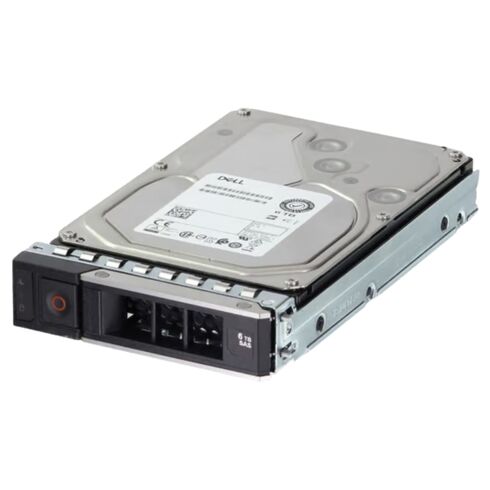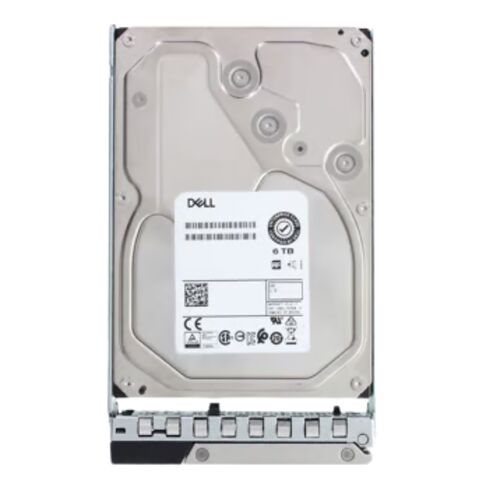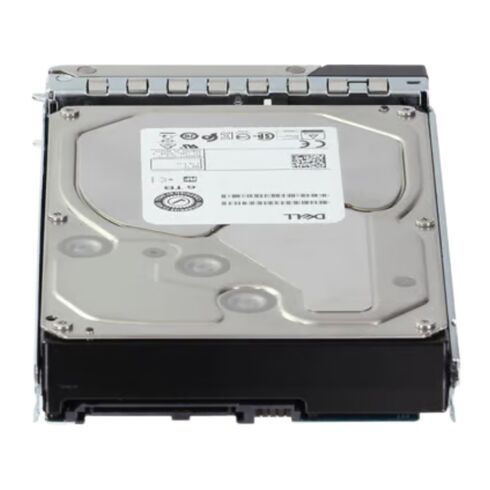400-AJOE Dell 6TB 7.2K RPM SAS 12GBPS LFF Hard Drive
- — Free Ground Shipping
- — Min. 6-month Replacement Warranty
- — Genuine/Authentic Products
- — Easy Return and Exchange
- — Different Payment Methods
- — Best Price
- — We Guarantee Price Matching
- — Tax-Exempt Facilities
- — 24/7 Live Chat, Phone Support
- — Visa, MasterCard, Discover, and Amex
- — JCB, Diners Club, UnionPay
- — PayPal, ACH/Bank Transfer (11% Off)
- — Apple Pay, Amazon Pay, Google Pay
- — Buy Now, Pay Later - Affirm, Afterpay
- — GOV/EDU/Institutions PO's Accepted
- — Invoices
- — Deliver Anywhere
- — Express Delivery in the USA and Worldwide
- — Ship to -APO -FPO
- — For USA - Free Ground Shipping
- — Worldwide - from $30
Same product also available in:
| SKU/MPN | Warranty | Price | Condition | You save |
|---|---|---|---|---|
| 400-AJOE | 1 Year Warranty | $355.00 | Factory-Sealed New in Original Box (FSB) with 3 Year Warranty | You save: $124.25 (26%) |
| 400-AJOE | 1 Year Warranty | $137.00 | Excellent Refurbished | You save: $47.95 (26%) |
Product Highlights
Introducing the Dell 6TB 7200RPM Near Line SAS Hard Disk Drive, designed for high-performance computing and data storage in 13G PowerEdge servers. This reliable and efficient storage solution comes with a hot-plug tray for easy maintenance and installation.
General Information
- Manufacturer: Dell
- Part Number: 400-AJOE
- Product Type: Hard Disk Drive with Tray
Technical Specifications
Device Characteristics
- Type: Hot-swappable Hard Drive
- Form Factor: 3.5 inches
- Interface: SAS 12Gbps
- Storage Capacity: 6TB
- Format: Advanced Format 512e
Performance Metrics
- Spindle Speed: 7200 RPM
- Drive Transfer Rate: 1200 Mbps (external)
Connectivity Options
Expansion & Compatibility
- Interface Ports: 1 x Serial Attached SCSI - 12Gbps
- Compatible Bays: 1 x Hot-swap - 3.5 inches
Compatible Systems
This hard drive is compatible with various DELL PowerEdge servers, including but not limited to:
- PowerEdge R210
- PowerEdge R230
- PowerEdge R310
- PowerEdge R320
- PowerEdge R330
- PowerEdge R410
- PowerEdge R415
- PowerEdge R420
- PowerEdge R430
- PowerEdge R510
- PowerEdge R515
- PowerEdge R520
- PowerEdge R530
- PowerEdge R710
- PowerEdge R720
- PowerEdge R720xd
- PowerEdge R730
- PowerEdge R730xd
- PowerEdge R910
- PowerEdge R920
- PowerEdge T310
- PowerEdge T320
- PowerEdge T330
- PowerEdge T410
- PowerEdge T420
- PowerEdge T430
- PowerEdge T610
- PowerEdge T620
- PowerEdge T630
- PowerEdge T710
- PowerVault DL2200
- PowerVault MD1200
- PowerVault MD3060e
- PowerVault MD3200
- PowerVault MD3200i
- PowerVault MD3600f
- PowerVault MD3600i
- PowerVault NX200
- PowerVault NX300
- PowerVault NX3000
- PowerVault NX3100
Capacity
The Dell 6TB 7.2K RPM SAS 12GBPS LFF Near Line Hard Drive is a high-capacity storage solution that offers users ample space to store their data. With a capacity of 6TB, this hard drive provides the flexibility and scalability required by businesses and individuals alike. Whether you need to store large files, run resource-intensive applications, or backup critical data, the 6TB capacity ensures you have more than enough room to meet your needs.
Benefits of a 6TB Capacity
1. Ample Storage: The 6TB capacity allows you to store a vast amount of data, including documents, photos, videos, and more. This is especially beneficial for businesses that deal with large amounts of data on a daily basis.
2. Improved Performance: With a larger storage capacity, you can avoid the need for frequent data transfers or clearing up space. This results in improved performance as you can access and retrieve data quickly.
3. Future-Proofing: As technology advances and files continue to grow in size, having a 6TB capacity ensures that your hard drive can accommodate the increasing demands for storage space in the future. You won't have to worry about running out of space anytime soon.
Importance of a Large Capacity for Businesses
For businesses, having a large capacity hard drive like the Dell 6TB 7.2K RPM SAS 12GBPS LFF Near Line Hard Drive is crucial for several reasons:
1. Data Storage and Backup: Businesses generate massive amounts of data every day, from customer information to financial records and employee files. Having a high-capacity hard drive allows them to store all this data securely and efficiently.
2. Scalability: As businesses grow, their storage needs increase exponentially. By investing in a 6TB capacity hard drive, businesses can scale their storage infrastructure without having to invest in additional hardware.
3. Cost-Effectiveness: A 6TB hard drive provides a cost-effective solution for businesses that require a large amount of storage space. It eliminates the need for multiple smaller drives, reducing both upfront and maintenance costs.
Backup and Recovery
With the 6TB capacity, you can easily create backups of your important data. Regular backups are essential to protect against data loss due to hardware failures, accidental deletion, or cyber threats. The large capacity ensures that you have enough space to keep multiple backups or create a comprehensive disaster recovery plan.
Speed
The Dell 6TB 7.2K RPM SAS 12GBPS LFF Near Line Hard Drive boasts a speed of 7.2K RPM (rotations per minute), making it ideal for users who require fast and efficient data access. The speed of a hard drive plays a crucial role in determining how quickly data can be read from or written to the drive, making it an important consideration for users looking to optimize their performance.
Benefits of 7.2K RPM Speed
1. Faster Data Access: The higher rotational speed of 7.2K RPM allows for faster data access, resulting in reduced latency and improved overall system performance. This is particularly advantageous for tasks that involve frequent data retrieval or transfer.
2. Enhanced Multitasking: With faster read and write speeds, users can perform multiple tasks simultaneously without experiencing significant slowdowns. This is especially beneficial when running resource-intensive applications or working with large files.
3. Efficient Data Transfer: The fast speed of this hard drive enables quick and seamless transfer of data between the drive and other devices. Whether you are copying files to external storage or sharing data across a network, the 7.2K RPM speed ensures efficient data transfer.
Importance of Speed in Different Applications
The speed of a hard drive is essential in various applications, and the 7.2K RPM speed of the Dell 6TB 7.2K RPM SAS 12GBPS LFF Near Line Hard Drive offers numerous advantages:
1. Gaming: Gamers require fast access to game files, updates, and patches. The 7.2K RPM speed ensures quick loading times and smooth gameplay, enhancing the overall gaming experience.
2. Video Editing: Video editing involves working with large video files that require frequent read and write operations. The high-speed performance of this hard drive allows for seamless editing and rendering of videos.
3. Database Management: Databases are critical for businesses, and fast data access is crucial for efficient database management. The 7.2K RPM speed ensures rapid retrieval and storage of data, enabling businesses to handle large volumes of information effectively.
Reduced Waiting Time
The 7.2K RPM speed significantly reduces waiting time when accessing files or launching applications. This translates into increased productivity and improved user experience, whether you are a professional working on critical projects or a casual user performing everyday tasks.
Interface
The Dell 6TB 7.2K RPM SAS 12GBPS LFF Near Line Hard Drive features a SAS (Serial Attached SCSI) interface with a data transfer rate of 12GBPS (gigabits per second). The interface plays a vital role in connecting the hard drive to your system and facilitating data transfer between them.
Benefits of SAS 12GBPS Interface
1. High Data Transfer Speed: The 12GBPS data transfer rate of the SAS interface ensures rapid and efficient data transfer between the hard drive and the system. This is particularly advantageous for applications that require fast access to large amounts of data.
2. Enhanced Reliability: SAS interfaces are known for their robustness and reliability. They provide a stable connection and are less prone to data corruption or transmission errors, ensuring the integrity of your data.
3. Scalability and Flexibility: The SAS interface offers scalability and flexibility for future expansion. It allows you to connect multiple hard drives in a daisy-chain configuration, enabling you to increase storage capacity without sacrificing performance.
Importance of Interface in Server Environments
In server environments, the interface of a hard drive is of utmost importance due to the demanding nature of these setups. The SAS 12GBPS interface offers several advantages in such scenarios:
1. Enterprise-Level Performance: Server environments require high-performance storage solutions to handle heavy workloads and multiple concurrent users. The SAS interface, with its high data transfer speed, ensures optimal performance in these demanding environments.
2. RAID Configuration: SAS interfaces are commonly used in RAID (Redundant Array of Independent Disks) configurations, which provide increased performance, fault tolerance, and data redundancy. The SAS 12GBPS interface enables seamless integration with RAID setups, enhancing the overall reliability and performance of the system.
3. Hot-Swapping Capabilities: The SAS interface supports hot-swapping, allowing for the replacement or addition of hard drives while the system is still running. This feature is crucial in server environments where continuous operation is essential, minimizing downtime and maximizing productivity.
Data-Intensive Applications
The 12GBPS data transfer rate provided by the SAS interface is particularly beneficial for data-intensive applications such as real-time analytics, virtualization, and high-performance computing. These applications require fast access to large datasets, and the high-speed interface ensures smooth and uninterrupted operations.
Form Factor
The Dell 6TB 7.2K RPM SAS 12GBPS LFF Near Line Hard Drive comes in LFF (Large Form Factor) size, which refers to the physical dimensions of the drive. The form factor determines the compatibility of the hard drive with the system and affects factors such as installation, storage capacity, and performance.
Benefits of LFF Form Factor
1. Increased Storage Capacity: LFF drives generally offer higher storage capacities compared to their smaller counterparts. This means that by choosing an LFF hard drive, such as this Dell 6TB model, you can enjoy greater storage capacity for your data-intensive needs.
2. Improved Cooling and Heat Dissipation: The larger size of LFF drives allows for better airflow within the system, resulting in improved cooling and heat dissipation. This is especially important in high-performance systems or server environments where heat management is critical.
3. Compatibility and Expandability: Many server chassis and storage systems are designed to accommodate LFF drives, making them widely compatible. By choosing an LFF hard drive, you ensure compatibility with a variety of systems and the ability to expand your storage infrastructure seamlessly.
Importance of Form Factor in Server Environments
In server environments, the form factor of hard drives plays a crucial role due to factors such as space constraints, compatibility, and scalability:
1. Rack Space Optimization: Server racks have limited space, and using LFF hard drives allows for better utilization of available rack space. With larger storage capacities per drive, you can maximize your storage density and minimize the number of drives needed.
2. System Compatibility: Server chassis and storage systems are typically designed to accommodate specific form factors. By selecting an LFF hard drive, you ensure compatibility with your existing infrastructure or future expansion plans.
3. Scalability and Redundancy: LFF drives offer scalability options through hot-swapping or RAID configurations, allowing for seamless expansion and redundancy. This is crucial in server environments where high availability and fault tolerance are essential.
Data Center Efficiency
The LFF form factor is well-suited for data center environments where optimizing space and power efficiency is critical. By utilizing LFF hard drives, data centers can achieve higher storage densities, reduce power consumption, and improve overall operational efficiency.
Part Number
The Dell 6TB 7.2K RPM SAS 12GBPS LFF Near Line Hard Drive has the part number 400-AJOE. The part number serves as a unique identifier for the specific hard drive model and helps users identify and order the correct product.
Benefits of Part Number Identification
1. Accuracy in Ordering: The part number ensures accuracy when ordering the Dell 6TB 7.2K RPM SAS 12GBPS LFF Near Line Hard Drive. By using the correct part number, you can be confident that you will receive the exact product you need, eliminating any confusion or potential compatibility issues.
2. Product Identification: The part number provides a quick and easy way to identify the specific hard drive model. This is especially useful when comparing different models or researching compatibility with your system or storage infrastructure.
3. Simplified Troubleshooting: In case of any technical issues or inquiries, having the part number readily available can assist support teams in providing accurate and efficient assistance. They can quickly reference the part number to troubleshoot or provide relevant information specific to the model.
Importance of Part Number in Server Maintenance
In server maintenance and upgrades, having accurate part numbers is crucial for several reasons:
1. Compatibility Assurance: Servers often have specific requirements for hard drive models and configurations. Using the correct part number ensures compatibility with your server's specifications, reducing the risk of compatibility issues or performance limitations.
2. Warranty Claims and Support: Should you encounter any issues covered by the manufacturer's warranty, having the correct part number is essential for initiating warranty claims or seeking support. The part number helps validate the product's eligibility for warranty coverage and speeds up the support process.
3. System Documentation: Part numbers are commonly used in system documentation, including server manuals, technical specifications, and configuration guides. By referencing the part number, you can ensure accurate documentation and avoid any confusion during installation or maintenance procedures.
Efficient Inventory Management
For businesses and IT departments, accurate part numbers facilitate efficient inventory management. By using specific part numbers, organizations can track and manage their hardware assets effectively, ensuring they have the right components available when needed and minimizing downtime due to inventory errors.











